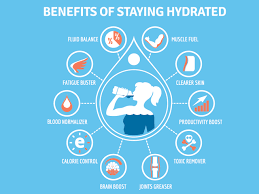Discover the essential role of water as a nutrient for optimal hydration and health. Learn why staying hydrated is key to your well-being and performance.
Water is often referred to as the essence of life, and for good reason. It is a cornerstone of human health and well-being, playing a vital role in nearly every bodily function. But did you know that water is also classified as an essential nutrient? In this article, we’ll explore why hydration is critical for maintaining good health, delve into the science behind water as a nutrient, and offer practical tips for ensuring you meet your hydration needs.
Why is Hydration Important?
The Biological Necessity of Water
Water constitutes about 60% of an adult human body and is critical for:
- Temperature Regulation: Water helps regulate body temperature through sweat and respiration.
- Nutrient Transport: It facilitates the delivery of nutrients and oxygen to cells.
- Waste Elimination: Water aids in the removal of waste products through urine and feces.
- Lubrication: Joints, eyes, and internal organs all rely on water for lubrication.
Without adequate hydration, these vital functions are impaired, potentially leading to dehydration and a host of related health issues.
The Signs and Risks of Dehydration
Dehydration occurs when your body loses more water than it takes in. Common symptoms include:
- Dry mouth
- Fatigue
- Dizziness
- Dark-colored urine
- Decreased skin elasticity
Severe dehydration can lead to complications such as kidney stones, urinary tract infections, and even heatstroke. Recognizing these signs early and taking corrective action is essential.
Water as a Nutrient: The Science Behind It
What Makes Water a Nutrient?
Unlike macronutrients like carbohydrates, proteins, and fats, water does not provide calories. However, it is classified as an essential nutrient because the body cannot produce sufficient amounts to meet its needs. We rely on dietary sources of water—from beverages and food—to maintain balance.
Functions of Water in the Body
Water plays a pivotal role in several physiological processes:
- Cellular Function: Water acts as a medium for biochemical reactions within cells.
- Metabolism: It aids in breaking down nutrients and converting food into energy.
- Detoxification: Water supports the liver and kidneys in detoxifying the body.
Daily Water Requirements
The amount of water you need depends on factors such as age, gender, activity level, and climate. General guidelines suggest:
- Women: 2.7 liters/day (91 ounces)
- Men: 3.7 liters/day (125 ounces)
Keep in mind that these amounts include water from all sources, including food and beverages.
How to Stay Hydrated Effectively
Best Practices for Staying Hydrated
- Start Your Day with Water: Drink a glass of water first thing in the morning to rehydrate after a night’s rest.
- Carry a Reusable Water Bottle: Having water readily available encourages regular sips throughout the day.
- Incorporate Hydrating Foods: Fruits like watermelon, oranges, and cucumbers are excellent sources of water.
- Set Reminders: Use apps or alarms to remind you to drink water regularly.
Avoiding Overhydration
While rare, overhydration—or water intoxication—can occur if you drink excessive amounts of water in a short period. Symptoms include nausea, confusion, and swelling. To avoid this, listen to your body’s thirst signals and drink accordingly.
The Connection Between Hydration and Overall Health
Physical Performance
Proper hydration is crucial for athletes and active individuals. Even mild dehydration can impair physical performance, leading to:
- Reduced endurance
- Increased fatigue
- Decreased coordination
Cognitive Function
Your brain is about 73% water, and hydration directly impacts cognitive performance. Studies show that dehydration can:
- Affect mood and concentration
- Impair memory
- Increase feelings of anxiety
Long-Term Health Benefits
Consistent hydration supports long-term health by:
- Promoting healthy skin
- Supporting kidney function
- Reducing the risk of chronic conditions such as hypertension
FAQs: Hydration and Health
How can I tell if I’m drinking enough water?
Check your urine color. Pale yellow indicates good hydration, while darker shades suggest you need more water.
Is it possible to drink too much water?
Yes, excessive water intake can lead to hyponatremia, a condition where sodium levels in the blood become dangerously low. This is rare and typically occurs with extreme overconsumption.
Do other beverages count toward my water intake?
Yes, beverages like tea, coffee, and milk contribute to your daily water intake. However, limit sugary and caffeinated drinks as they can have diuretic effects.
Are there specific times when hydration is more important?
Yes, prioritize hydration during exercise, in hot climates, and when you’re unwell (e.g., with fever or diarrhea).
Conclusion
Water is far more than a thirst quencher—it is an essential nutrient vital for life. By understanding its role in hydration and health, you can take proactive steps to ensure your body receives the water it needs. Prioritize hydration to enhance your physical performance, mental clarity, and overall well-being. Remember, a hydrated body is a healthy body.
So, grab that glass of water and take a step toward better health today!